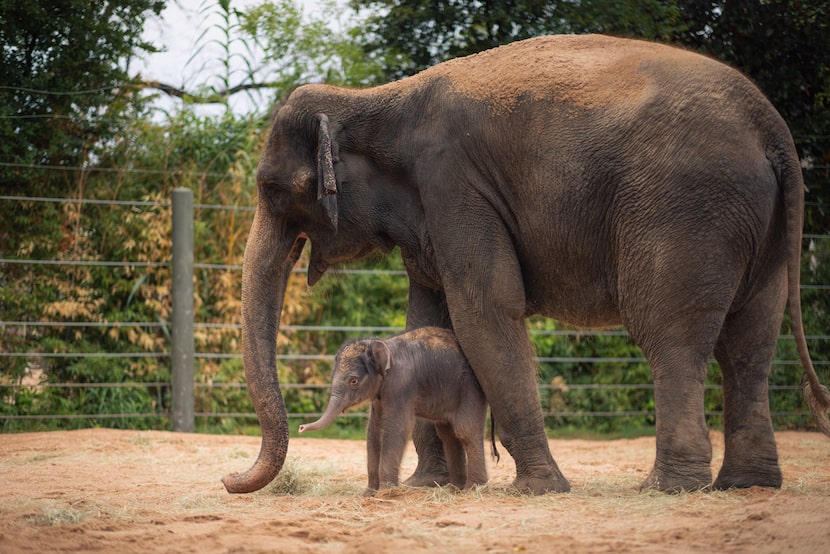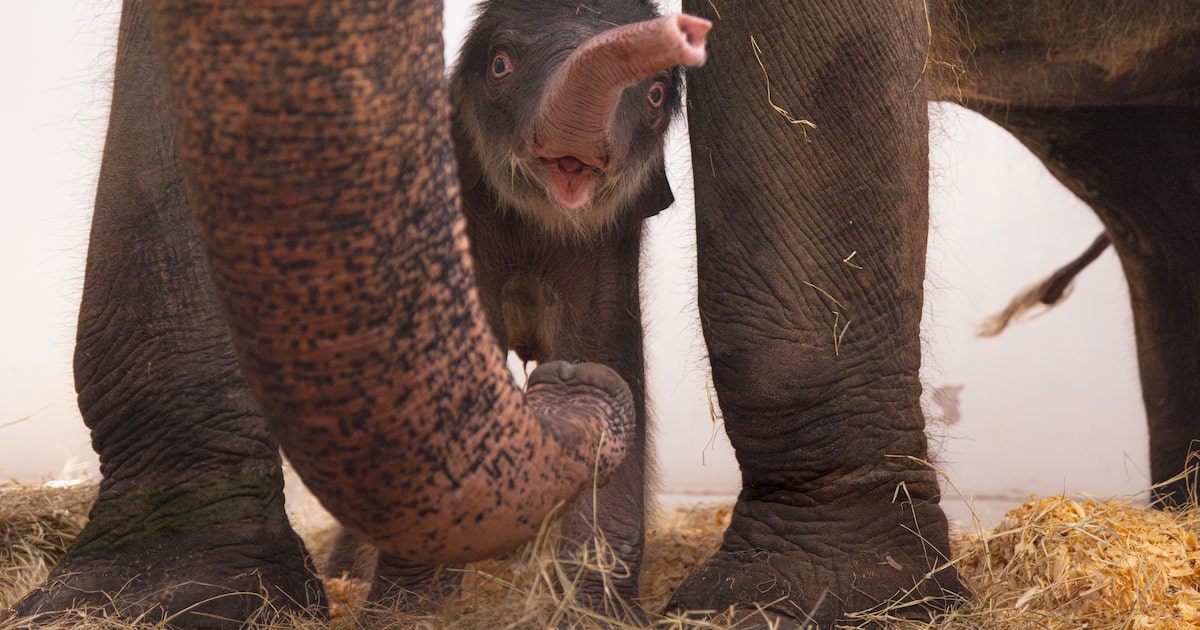The Fort Worth Zoo’s elephant dynasty just got a tiny heavyweight.
On Friday, the zoo announced the birth of a female Asian elephant, the first such calf born there since 2013. The not-so-little bundle of joy came into the world on Aug. 18, weighing in at 250 pounds and measuring 36 inches tall. She was on her feet within six minutes and nursed within two hours, maneuvering her trunk deftly like a healthy baby would.

The zoo said mother and daughter have been bonding, a crucial step for development. The calf also is acclimating to her new surroundings.
Fort Worth
The calf’s mother is Bluebonnet, a 26-year-old and the first elephant born at the zoo, in 1998. Her father, Romeo, is a 32-year-old who arrived in 2015 from the Ringling Bros. and Barnum and Bailey Center for Elephant Conservation in Florida.
The calf joins half-brother Travis, born to mother Belle in 2023, and full brother Brazos, born to Bluebonnet in 2021. Asian elephant pregnancies typically last 18 to 22 months.
With the new calf, the herd now has nine members, said Erin Halvey, a spokesperson for the zoo. In addition to those mentioned above, there’s Colonel, an adult male, and a pair of adult females, Angel and Rasha, the herd’s matriarch and mother to Bluebonnet.
Asian elephants are endangered, with estimates ranging from 30,000 to 50,000 in the wild, according to the United States Fish and Wildlife Service. Decline in their numbers has been driven by habitat loss, human-elephant conflict and poaching, the agency reported.
Breaking News

The new calf lying in her habitat.
Fort Worth Zoo
African elephants are also endangered, but are much more numerous, with about 415,000 in the wild, according to the World Wildlife Fund.
The Fort Worth Zoo recognizes both “species face growing threats and declining populations,” said Ramona Bass, chairperson of its board of directors, in a press release. “We have been specifically committed to the conservation of Asian elephants since 1998, through our dedicated breeding program here in Fort Worth, while contributing to global efforts to protect elephants in the wild through [the International Elephant Foundation].”
Conservation efforts at zoos and in the wild are challenged by something called elephant endotheliotropic herpesvirus. This virus naturally infects elephants but usually remains dormant.
Scientists don’t know why or how the virus becomes activated; once it does, it can cause a rapid and fatal hemorrhagic disease that is the leading cause of death in Asian elephant calves and young African elephants. In 2024, Brazos at the Fort Worth Zoo received a vaccine targeting the virus as part of research that could one day protect more elephants.

Fort Worth Zoo’s newborn calf with her mother, Bluebonnet.
Fort Worth Zoo
The zoo said Bluebonnet and her new daughter have been bonding, a crucial step for development. Visitors can view the calf at the Elephant Springs exhibit from 10 a.m. to 2 p.m. daily, weather permitting.
You can also help pick her name, which, in a nod to her mom, will be Texas flower-themed. Choices are Lady Bird (“Birdie”), Black-eyed Susan (“Susie”) and Yellow Rose (“Rosie”). Voting is open through Oct. 6 at 10 a.m. on the zoo’s website, and the winning name will be announced the next day.
Miriam Fauzia is a science reporting fellow at The Dallas Morning News. Her fellowship is supported by the University of Texas at Dallas. The News makes all editorial decisions.
 Letters to the Editor — Gambling rooms, clean air standards, autism, Sunday’s paper
Letters to the Editor — Gambling rooms, clean air standards, autism, Sunday’s paper
Readers explain the poker club decision; urge EPA to keep clean air standards; detail the history of autism; and loved the DMN Sunday edition.
 Why do we crave fried food? The science behind it as the state fair returns
Why do we crave fried food? The science behind it as the state fair returns
From corn dogs to funnel cake, there’s a reason why we find these foods so delicious and addictive.
 Is there a link between young women’s cycles and ACL injuries? What $1M aims to find out
Is there a link between young women’s cycles and ACL injuries? What $1M aims to find out
Backed by Lyda Hill Philanthropies, Scottish Rite will test whether syncing training to the menstrual cycle can prevent this common sports injury.
 UNT researchers grow mini-hearts with blood vessels. Here’s why that’s important
UNT researchers grow mini-hearts with blood vessels. Here’s why that’s important
Lab-made recipe could be a step toward better drug testing and scientific research.
 Is Tylenol safe to use during pregnancy? Here’s what medical experts say
Is Tylenol safe to use during pregnancy? Here’s what medical experts say
Trump, RFK Jr. linked acetaminophen to autism — but doctors say the drug is generally safe for pregnant women
